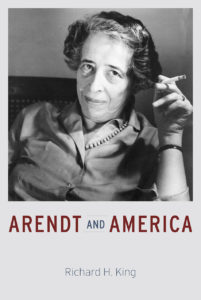Roundtable, Richard H. King, Arendt and America (Chicago University Press, 2015)
Introduction by Lilian Calles Barger
The plans for this roundtable on Arendt and America began with a podcast conversation
with Richard H. King recorded at the Society’s 2015 conference in Washington DC. His long career includes teaching at Stillman College, the University of the District of Columbia, Vanderbilt and the University of Nottingham (UK). He has edited three books and is the author of The Party of Eros: Radical Social Thought and the Realm of Freedom
(1972); A Southern Renaissance: The Cultural Awakening of the American South (1980); Civil Rights and the Idea of Freedom (1992), and Race, Culture and the Intellectuals, 1940-1970 (2004). Before my conversation with King, I knew something about Arendt having researched her critique on the political role of religion and I was aware of the voluminous amount of scholarship she had inspired. One of my first questions was what else was there to say about Arendt?
The freshness of King’s approach in a sea of Arendt studies is showing how the idea of America shaped Arendt’s thought and challenges scholarship that regards her solely as a product of Europe. His reading offers us an intellectual whose quintessential experience as an immigrant and through the process of transculturation arrives at a distinct set of  ideas neither fully foreign, nor American. The LA Review of Books called Arendt and America “ambitious and illuminating” in an already crowded field and his scholarly interlocutors are paying attention. The importance by which Ardent is regarded as a public intellectual of Cold War America and King’s luminous reputation called for this roundtable.
ideas neither fully foreign, nor American. The LA Review of Books called Arendt and America “ambitious and illuminating” in an already crowded field and his scholarly interlocutors are paying attention. The importance by which Ardent is regarded as a public intellectual of Cold War America and King’s luminous reputation called for this roundtable.
We have gathered a group of distinguished scholars to provide their assessment of King’s contribution to the field. Their expertise is wide-ranging and interdisciplinary and include Neil Roberts
, Chair of Religion, Associate Professor of Africana Studies, and Faculty Affiliate in Political Sciences at Williams College; Seyla Benhabib, the Eugene Meyer Professor of Political Science and Philosophy at Yale University; Mira Siegleberg, a post-doctoral fellow Princeton University, and a lecturer in the Council of the Humanities and History and John Burt
, the Paul Prosswimmer Professor of American Literature at Brandeis University. The issues that King and these scholars consider are sure to fuel discussion among both admirers and detractors of Arendt.
Thank you to the above scholars and you the reader for participating in this roundtable.
—Lilian Calles Barger http://www.lilianbarger.com

2 Thoughts on this Post
S-USIH Comment Policy
We ask that those who participate in the discussions generated in the Comments section do so with the same decorum as they would in any other academic setting or context. Since the USIH bloggers write under our real names, we would prefer that our commenters also identify themselves by their real name. As our primary goal is to stimulate and engage in fruitful and productive discussion, ad hominem attacks (personal or professional), unnecessary insults, and/or mean-spiritedness have no place in the USIH Blog’s Comments section. Therefore, we reserve the right to remove any comments that contain any of the above and/or are not intended to further the discussion of the topic of the post. We welcome suggestions for corrections to any of our posts. As the official blog of the Society of US Intellectual History, we hope to foster a diverse community of scholars and readers who engage with one another in discussions of US intellectual history, broadly understood.
What a lineup! Can’t wait to read along. Nice work, Lilian.
Ditto. Congrats Lilian!